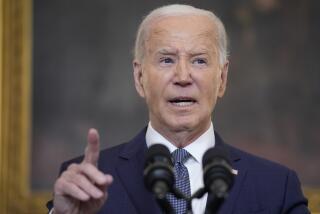Desperation at Camp David
Summit meetings between national leaders are usually staged to put a ceremonial stamp of approval on agreements already reached by subordinates. Next week’s scheduled Israeli-Palestinian summit at Camp David will be different. President Clinton has summoned Israel’s Prime Minister Ehud Barak and the Palestinian Authority’s Yasser Arafat to the Maryland retreat because their lower-level negotiators have failed to break the stalemate on the hardest of the issues facing the two sides. Clinton hopes to do what President Jimmy Carter did at Camp David over a dozen days in 1978, when he got the leaders of Egypt and Israel to agree on a framework for peace. Some U.S. diplomats rate the chances of a successful summit this time at only one in three, and that’s realistic.
The talks will open two months before the Sept. 13 deadline that Barak and Arafat set last year as the target date for completing a peace treaty. That is also the date fixed by Arafat for proclaiming an independent Palestinian state, even in the absence of a treaty. Such a move would probably prompt Israel to annex those parts of the West Bank where Israeli settlements are thickest, foreclosing any future territorial compromises. No one should have any illusions as to what these unilateral measures would probably lead to: a collapse of negotiations and renewed violence that would rival or exceed that of the 1987-94 Palestinian intifada.
Clearly the Camp David talks will take place in an atmosphere of urgency, even desperation. There’s no such thing as a last chance when it comes to making peace in the Middle East, but there is a pervasive feeling that if Barak and Arafat fail to make major progress now on such basic issues as the boundaries of a future Palestinian state and the status of Jerusalem, it will be a long time before they--or more likely their hard-line successors--will be ready to try again.
Clinton says the United States seeks “an outcome that is realistic, balanced and fair,” one in which “neither side can achieve 100% of its goals.” That’s another way of saying that Arafat and Barak will have to accept politically costly compromises that many in their constituencies abhor and will vigorously oppose. The two leaders can duck that responsibility, but only if, as Barak put it, they are prepared to see their conflict “ continue for another 30 years.” That succinctly and probably accurately defines the stakes at Camp David.
More to Read
Sign up for Essential California
The most important California stories and recommendations in your inbox every morning.
You may occasionally receive promotional content from the Los Angeles Times.










